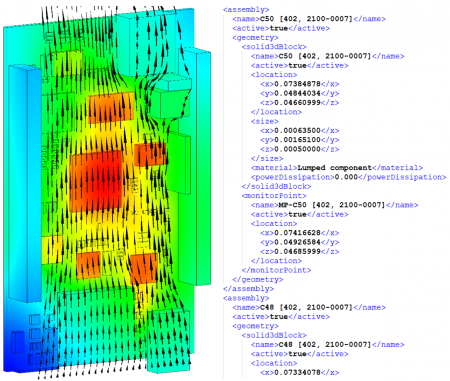Standard arrives for thermal simulation data
A de facto standard for exchanging thermal information about designs has become a JEDEC standard. Based on XML, the JEP181 standard lets tools share data on thermal behavior, easing the job of combining data from different components in system simulations.
The Siemens Digital Industries Software thermal-design group originally proposed the Electronics Cooling eXtensible Markup Language (ECXML) as a response to the need for customers to model the heat generated by components such as microprocessors in systems. The absence of a uniform format for the exchange of thermal simulation data that could be used across the supply chain led to unnecessary duplication of effort and a greater potential for errors.
“The JEP181 standard from JEDEC benefits thermal design engineers by providing wider availability of the key data necessary to validate the thermal performance of today’s advanced designs,” said Ghislain Kaiser, senior director at Intel. “This standardized format will allow more interoperability between engineering teams, leading to substantial time and cost savings by removing design barriers previously common in thermal engineering.”
Image Example of a thermal simulation and associated ECXML file
Instead of spending hours pulling thermal information from product data sheets or re-implementing 2D engineering drawings within thermal simulation tools, engineers can import the XML files produced by commercial 3D simulation tools. According to Siemens, the JEP181 standard is ideal for emerging technologies and trends such as miniaturization, 2.5D and 3D semiconductor packaging, and 5G technology– all of which demand increased power dissipation density.
“As a leader in industrial software solutions, our contribution to the new JEP181 standard can help drive the digitalization of design data to reduce both time and errors for today’s innovative electronics products,” said Jean-Claude Ercolanelli senior vice president of simulation and test solutions at Siemens. “Enabling a seamless digitalized software flow can radically increase the efficiency and accuracy of thermal simulation and thus, enhance the performance and reliability of digital twin prototypes and manufactured products.”



